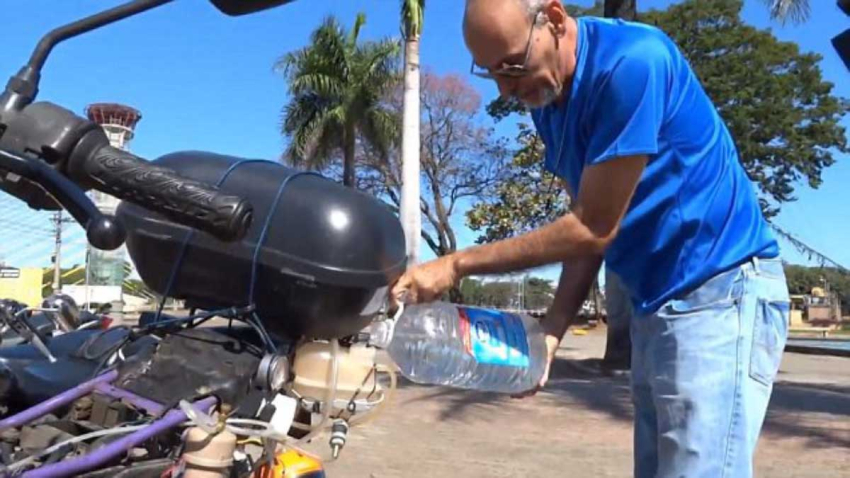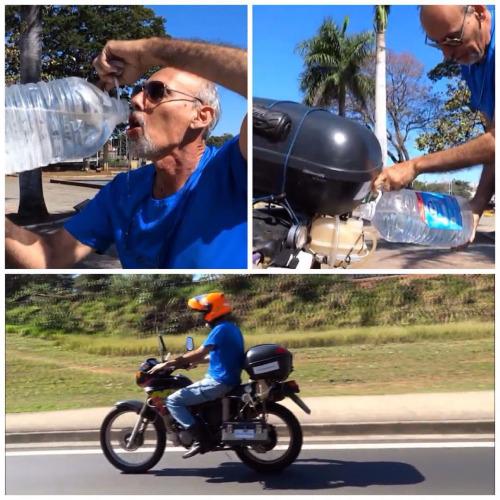SAO PAULO (Web Desk) – A motorcycle able to travel up to 500 kilometres (310 miles) on a litre of water is turning heads in Brazil.
The ‘T Power H20’ motorcycle was created by Sao Paulo-based public officer Ricardo Azevedo and can even be powered on polluted river water.
The design features a combination of water and a single external car battery, which is used to produce electricity and separate hydrogen from the water molecule.
The process, involving a pipe-system, results in combustion which subsequently creates the energy necessary to power the bike.
In a recently released video, Azevedo is shown drinking from a water bottle before pouring it into the tank to prove that his bike runs solely on water and not some kind of fuel.
But clean water is optional, as he later demonstrates by filling the tank with polluted water from the Tiete River.
The T Power H2O motorcycle incorporates an external car battery that produces electricity and separates hydrogen from water molecules. This results in combustion, releasing energy that fuels the bike.
“The advantage of this motorcycle, which works with the hydrogen that comes from the water, is that the result that comes of the exhaust is water vapor,” Azevedo explains. “This is different from gasoline, the result of which is carbon monoxide.”
For now, Azevedo’s special motorcycle is only a prototype, but since it doesn’t compromise on looks – it seems every bit as cool and rugged as a regular motorcycle – it may prove a hit with motorcycle enthusiasts if he can find investors willing to mass produce it.
News of the T Power H2O motorbike and footage of Ricardo Azevedo driving and refueling it with water captured the imagination of thousands of motorists in South America, but also generated some concerns about the accuracy of the reports.
The Oddity Central reported that a number of people have claimed that the external battery used for the electrolysis process could not generate enough energy to keep the bike running for the reported 310 miles.
To this Azevedo answered that they use a system similar to the Kinetic Energy Recovery System (KERS) used in Formula 1 to recharge the battery on the go.
While this does not eliminate the need for an eventual recharge, it increases battery life significantly. Thus the bike can run for approximately 10 hours.
Others claimed that the amount of hydrogen created through simple electrolysis could not generate enough energy to power the T Power H2O. Gabriel Azevedo, who helped his father build the revolutionary motorcycle, said they use a variety of chemical additives that make the electrolysis process 350% more efficient.
He added that they tested a number of additives of six months, and that they could achieve even better results, but more research is necessary. Azevedo also pointed out that even though these additives raise the cost of the system, it’s still more cost-effective than common combustion systems.
Another inconsistency pointed out by readers was that the hydrogen seemed to pass through the motorcycle’s original engine, without any modifications. Both Ricardo Azevedo and Ernesto Gonzalez, a professor of chemistry at the University of Sao Paulo confirmed that the original combustion system can be used to burn hydrogen without any problem.
They referred to the cars that ran on cooking oil during the 80’s and 90’s as an example.
There were a number of other questions brought up by amateur motorists, but Azevedo answered them all and offered to take the T Power H2O to an official Honda motorcycle dealer where proper tests can be performed in order to justify his claims.
“I’ve made contact with the dealership and a qualified mechanic will conduct and assess the tests. I am also willing to explain and demonstrate the system for those who are interested,” he said.

















